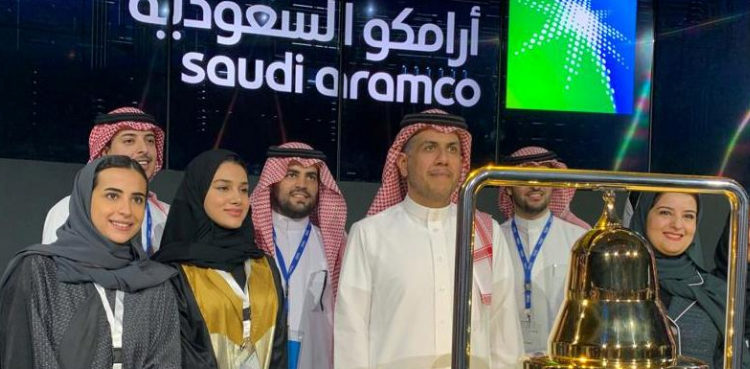
RIYADH/DUBAI: Saudi Aramco shares surged the maximum permitted 10% above their initial public offering (IPO) price on their Riyadh stock market debut on Wednesday, closing in on the $2 trillion valuation long sought by Saudi Crown Prince Mohammed bin Salman.
The shares leapt to 35.2 riyal ($9.39) each, up from the IPO price of 32 riyals and at the daily limit of price moves allowed by the Tadawul exchange.
That gives the state-owned oil giant a market value of about $1.88 trillion, comfortably making it the world’s most valuable listed company, although it will have one of the smallest “free floats” of publicly tradeable shares, at just 1.5%.
By comparison, U.S. oil major Exxon Mobil has a market capitalization of less than $300 billion, while U.S. tech giant Apple APPL.O is valued at about $1.2 trillion.
Earlier this month, Tadawul introduced an index weighting cap of 15% to address concerns about the potential impact of Aramco’s flotation and limit the index’s correlation to the oil price.
Aramco’s debut comes as oil prices are being supported by a Saudi-orchestrated move by OPEC and oil producing allies to commit to some of the industry’s deepest output cuts in a decade to try to avert oversupply.
But Riyadh scaled back its global ambitions by only listing Aramco on the Tadawul and cancelling roadshows in New York and London due to muted interest from foreign investors.
Most actively managed funds said they would likely steer clear of the IPO, citing concerns about governance, the environment and regional geopolitics, according to information provided to Reuters by 26 major asset managers outside the Gulf region.
If Aramco shares gain 10% on both Wednesday and Thursday, it will exceed the $2 trillion valuation coveted by Prince Mohammed. The company is expected to be included in the MSCI emerging markets index on Dec. 17.
Saudi energy minister Prince Abdulaziz bin Salman told Reuters last week he believed Aramco was worth more than its $1.7 trillion IPO valuation.
“I cannot wait to see the faces of people who missed that opportunity and how they will be chewing their thumbs,” the minister said, calling those who invested “friends and family” set to benefit from any future rise in its value.
Aramco has not named its investors during the IPO process, but sources familiar with the matter have told Reuters the Abu Dhabi Investment Authority (ADIA) and Kuwait Investment Authority (KIA) were among Gulf sovereign funds to buy shares.
Earlier this month, Tadawul introduced an index weighting cap of 15% to address concerns about the potential impact of Aramco’s flotation and limit the index’s correlation to the oil price.
Aramco’s debut comes as oil prices are being supported by a Saudi-orchestrated move by OPEC and oil producing allies to commit to some of the industry’s deepest output cuts in a decade to try to avert oversupply.
But Riyadh scaled back its global ambitions by only listing Aramco on the Tadawul and cancelling roadshows in New York and London due to muted interest from foreign investors.
Most actively managed funds said they would likely steer clear of the IPO, citing concerns about governance, the environment and regional geopolitics, according to information provided to Reuters by 26 major asset managers outside the Gulf region.
If Aramco shares gain 10% on both Wednesday and Thursday, it will exceed the $2 trillion valuation coveted by Prince Mohammed. The company is expected to be included in the MSCI emerging markets index on Dec. 17.
Saudi energy minister Prince Abdulaziz bin Salman told Reuters last week he believed Aramco was worth more than its $1.7 trillion IPO valuation.
“I cannot wait to see the faces of people who missed that opportunity and how they will be chewing their thumbs,” the minister said, calling those who invested “friends and family” set to benefit from any future rise in its value.
Aramco has not named its investors during the IPO process, but sources familiar with the matter have told Reuters the Abu Dhabi Investment Authority (ADIA) and Kuwait Investment Authority (KIA) were among Gulf sovereign funds to buy shares.



0 Comments